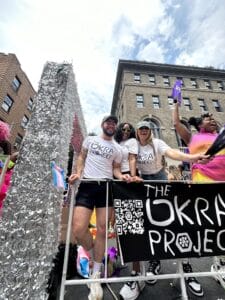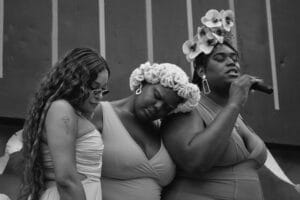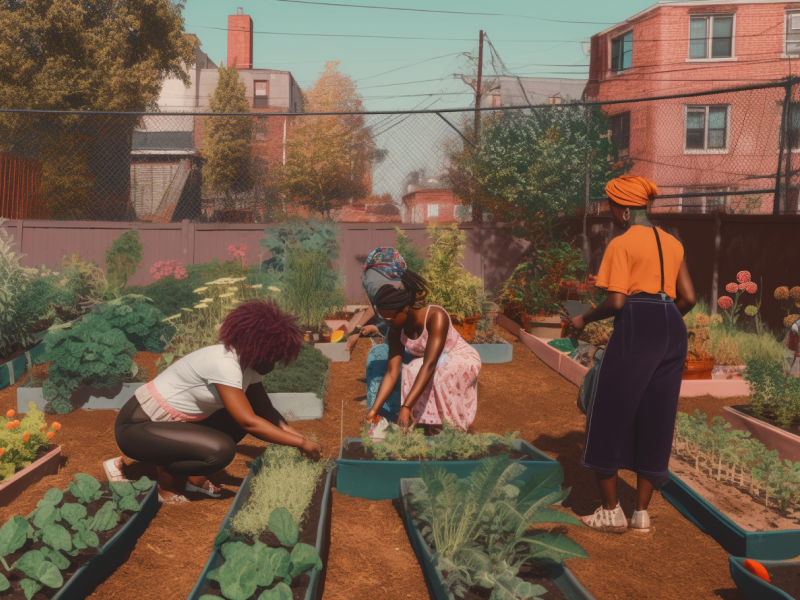The Okra’s Project’s new initiative offers three months of free therapy to support Black transgender individuals nationwide
The Okra Project, a nonprofit dedicated to nourishing and sustaining Black transgender, nonbinary, and gender-expansive communities, is deepening its impact. In partnership with BetterHelp, the organization will now provide up to three months of free or low-cost therapy to Black trans people across the United States.
This groundbreaking initiative expands mental health access by connecting participants with affirming, licensed professionals via phone, video, or messaging—addressing long-standing barriers such as cost, discrimination, and lack of access to affirming care.
View this post on Instagram
For The Okra Project, this step represents a natural evolution of its mission. Since its founding in 2018, the organization has provided nearly $3 million in direct mutual aid to nearly 10,000 Black and brown trans and gender-expansive individuals. Its programs include home-cooked meals, rental assistance, wellness stipends, the Rides and Meals Fund, Okra Academy culinary training, the International Grocery Fund, and healing-centered events such as #ByOkra.
“Access to mental health care is not a luxury — it’s a necessity, especially for Black trans people who are navigating multiple layers of trauma, discrimination, and erasure,” said Gabrielle Inès Souza, Executive Director of The Okra Project. “This initiative with BetterHelp is a vital step in helping our community receive consistent, affirming care without financial burden.”
From its beginnings as a grassroots food justice effort to its current role as a nationally recognized 501(c)(3), The Okra Project continues to work at the intersection of survival and liberation—ensuring Black trans people have not only the means to survive, but also the opportunity to thrive.

Photo Credit: The Okra Project
A Conversation with Gabrielle Inès Souza
Executive Director, The Okra Project
To better understand the vision behind this expansion, GLAAD sat down with Gabrielle to discuss the organization’s evolution, the urgent need for mental health care in Black trans communities, and what liberation looks like in practice. Read on to learn more!
Shiko Njoroge: The Okra Project began as a grassroots response to food insecurity in the Black trans community. How do you see this expansion into mental health services continuing that original mission, and what does this evolution represent to you?
Gabrielle Inès Souza: The Okra Project started with food because food is essential for survival. It’s difficult to think about therapy or building a future if you’re hungry today. So when we are discussing our expansion into mental health and highlighting those efforts, it’s really a deepening of that same mission, which is making sure Black trans folks have the tools to thrive, not just survive. To me, this evolution represents growth. We’re saying survival isn’t the finish line. Our people deserve nourishment, yes, but also healing, peace of mind, and the space to dream. That’s what this priority into mental health is about.
Shiko Njoroge: You’ve emphasized that “access to mental health care is not a luxury — it’s a necessity.” What does that belief mean to you personally, and how has it shaped your vision for The Okra Project under your leadership?
Gabrielle Inès Souza: Saying mental health care isn’t a luxury is personal for me. I’ve seen what happens when my community can’t access care, when survival means ignoring your own pain because there’s no one safe to turn to. Under my leadership, I want The Okra Project to be the opposite of that. I want it to be a place where people know that their well-being is a necessity we’ll fight to protect. My vision is grounded in creating ease and support, so our community isn’t always in fight or flight mode. We deserve to be held, cared for, and affirmed in our humanity.

Photo Credit: The Okra Project
Shiko Njoroge: The new initiative with BetterHelp addresses cost and access—two of the biggest barriers to care. Beyond those challenges, what other systemic or cultural barriers do Black trans people face when seeking affirming mental health support?
Gabrielle Inès Souza: Cost and access are huge barriers, but they’re not the only ones. Black trans people often walk into therapy rooms where providers don’t understand us, or worse, where we’re misgendered, pathologized, or we find ourselves having to educate the person who’s supposed to be helping us. On top of that, there’s stigma amongst Black and brown communities about talking openly about mental health. So it’s not just about “is therapy available?” It’s about “is it safe? Is it affirming? Is it going to build me up instead of tear me down?” That’s the next level of barrier we’re up against.
Shiko Njoroge: The Okra Project has described its work as meeting people “at the intersection of survival and liberation.” How does this initiative, in particular, move Black trans people closer to liberation rather than just survival?
Gabrielle Inès Souza: Survival is making sure someone has food and a therapist they can talk to. Liberation is when that same person has resources, safety, and agency to live fully and unapologetically, without constantly negotiating for their right to exist. This initiative moves us closer to liberation because it shifts us from crisis response to creating conditions where Black trans people can imagine and build futures on their own terms.

Photo Credit: The Okra Project
Shiko Njoroge: Stepping into the role of Executive Director, you bring both grassroots activism and executive strategy. How has your personal journey shaped the way you lead The Okra Project, and what values guide you as you chart its next chapter?
Gabrielle Inès Souza: Well, first and foremost, I am a Black trans woman. I’ve lived and continue to live the reality of what it means to navigate this country and world in my identity. The disparities I’ve experienced firsthand are what fuel me to push for change. But as a leader, I don’t just lead from my lived experience, I also draw deeply on my professional background and the lessons I’ve learned along the way. My journey has been both grassroots and executive, and honestly, I think that’s my biggest strength as a leader. The values that guide me are transparency, accountability, and radical care. If we can’t model those things inside our organization, we can’t expect our community to trust us with them.
Support the Mission
The Okra Project depends on the generosity of donors and the strength of partnerships to continue its life-saving work. Every contribution helps provide meals, housing, wellness resources, and now mental health care for Black trans communities nationwide.
To donate or explore partnership opportunities, visit www.theokraproject.com. Together, we can build a world where Black trans people not only survive—but thrive.













